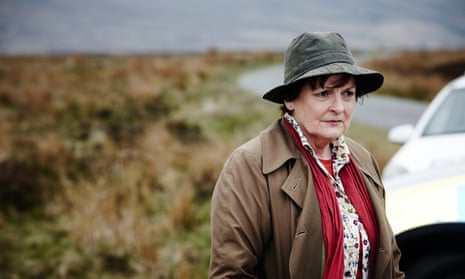There are now roughly as many types of crime series as there are crimes. The ones that make you scratch your head, or covet knitwear, or sign Change.org petitions or feel a bit stupid (yes, Sherlock, I’m talking about you). Then there are the ones that make you feel cosy, mildly creeped out, and in sudden need of a holiday cottage on the windswept northern coast, all at the same time. You know, the really British ones. These series induce a weird yet not entirely unpleasant brew of emotions, which is precisely the analgesic many of us are after as we lie slumped and silly on our sofas on Sunday night.
Vera (ITV) slots into this latter category as neatly as a dry stone in a Northumbrian wall. It took me about five seconds to glaze over. In a good way. There she was, Brenda Blethyn’s DCI Vera Stanhope, stomping across the moor. (She was clearing her head, something she does a lot by walking across the moor, which is convenient because it looks so ruddy lovely.) A defiant and lonely figure, hatted and mac-ed. The moor all rugged and dusky. Nothing but a new day and a solvable murder on the horizon. What’s not to like? By the time the camera panned over an old stone cottage and the deserted sands it overlooked, I was gone.
Closely followed by Northumberland, Blethyn is the best thing about Vera – now on its sixth series and still watched by millions, most of whom are awake – by a long shot. It’s stating the obvious (something this series does a lot), but I just can’t imagine Vera without Vera. She has the loveliest voice, at once girlish and gruff. Her face is kind but means business. Not many actors can pull off shambolic and effective, but Blethyn can do it with a single, penetrating glance from beneath that hat. She is sensitive but often fails to see the grouse for the moors. Like at the start of the episode when she sees the body of a woman found lying on the moor and pronounces her in her late 30s. “More like 50s, look at her hands,” one of the team corrects her. Oh well, only 20 years out. Sometimes, when I saw her pulling up in her battered Land Rover, I forgot what I was watching and thought she was the village vet.
Anyway, it fails to matter that Vera doesn’t twig who the murderer is until it’s so obvious even I had figured it out – and I never figure it out. She’s Vera! She calls people “pet” and “love”, even when she’s about to bring them in for questioning. She knows the Latin names of plants and can say them out loud without looking like a pretentious git. She’s been trained by Mike Leigh, for God’s sake. Let’s show some respect.
The plot is of the neat and tidy box-ticking variety. And my word, it drags on. Six ad breaks come and go as Vera bumbles about the beautiful place investigating the murder of a grandmother recently returned from Edinburgh to reconcile with her two daughters. We learn a lot about a lot. About the lady’s mantle (I can’t remember its Latin name), a flowering plant more usually found on the roadside than the moors. About the fractious relationship between the victim and her daughters, the farmer with the grudge, the publican who doesn’t want to upset the locals, the secret boyfriend working for a local taxi firm, the neighbour who heard a car door slam, his carer who may or may not be posting abusive comments online … Pretty much the only person who isn’t questioned is Richards’ two-year-old granddaughter.
Just as I was really glazing over, still in a good way, things got quite exciting. The big reveal – well, for Vera anyway – prompted a car chase (across the moor, naturally) and something genuinely unexpected happened. The sort of real, dark, sad thing you don’t expect in a crime series like Vera. Suffice to say I was momentarily jolted out of my Sunday night stupor. In a good way, obviously.
Is Storyville, A Death Row Tale: The Fear of 13 (BBC4, Sunday) part of the true crime wave that includes Serial, The Jinx and most recently Netflix’s Making A Murderer? Sort of. It’s a documentary by British director David Sington about a convicted murderer, Nick Yarris, who after 23 years on death row petitioned for the right to be executed promptly, despite maintaining his innocence. Sington presents this remarkable story in the style of a one-man play. Most of the film is Yarris, on his own, talking against a black background. It’s intense. And what an extraordinary storyteller he is, whether recounting the “institutional sock threaded into the torn tissue” of his feet after a three-hour chase across the country or the joy of learning to read novels in prison. In fact it’s all so polished, charismatic and evocative of classic American crime fiction that I actually thought Yarris was being played by an actor at first. That’s the issue with this curiously addictive strain of stranger-than-fiction crime. As long as the genre relies on the devices of fiction to tell a strange story, it can end up feeling a bit unreal.

Comments (…)
Sign in or create your Guardian account to join the discussion